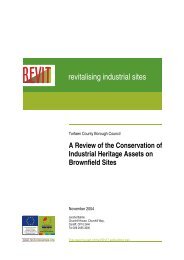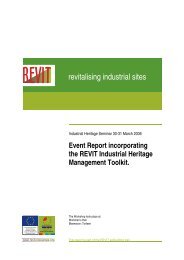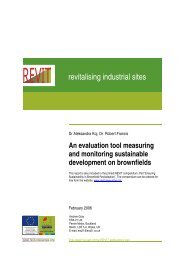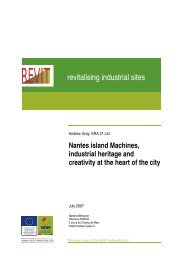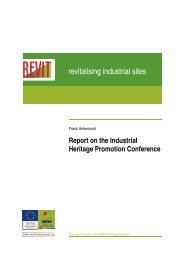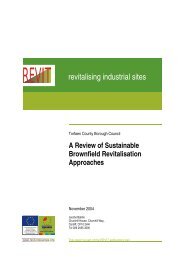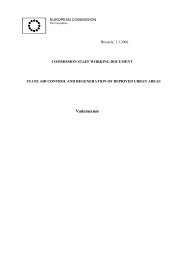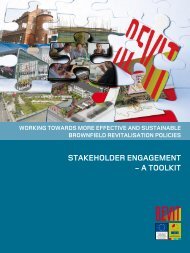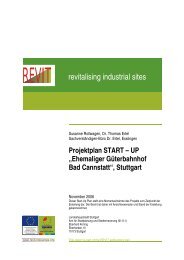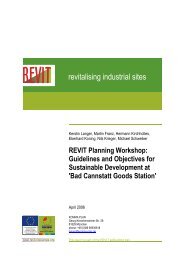Final announcement - REVIT
Final announcement - REVIT
Final announcement - REVIT
Create successful ePaper yourself
Turn your PDF publications into a flip-book with our unique Google optimized e-Paper software.
Towards More Effective And Sustainable Brownfield Revitalisation Policies<br />
<strong>Final</strong> <strong>announcement</strong><br />
2 nd International Conference on Managing Urban Land<br />
April 25 th – 27 th 2007 Theaterhaus Stuttgart
Patronage & Foreword<br />
Dr. Wolfgang Schuster<br />
Mayor of Stuttgart<br />
Prof. Dr. Danuta Hübner<br />
EU Commissioner for<br />
Regional Policy<br />
a warm welcome to the 2 nd international<br />
conFerence on managing urban land<br />
Welcome to the city of Stuttgart, Capital of the state of Baden-Württemberg. The issues that will<br />
be addressed at the 2nd International Conference on Managing Urban Land are of great importance<br />
to all local and regional authorities both in Europe and in the rest of the world. How can we succeed<br />
in promoting employment and growth without consuming additional resources? How can we use<br />
urban brownfields in order to revitalizes and modernizes our cities? I am delighted that Stuttgart<br />
has the privilege to serve as venue for this major conference.<br />
We see ourselves as an international city and are therefore very much interested in an exchange<br />
on the European and international levels. In Stuttgart people from over 170 nations live together<br />
in peaceful coexistence. Over 100 languages are spoken here. Over the years, we have built up<br />
numerous networks on subjects ranging from mobility, to social integration policies, development<br />
aid, child friendliness or the challenges posed by demographic change. It is our firm belief that the<br />
best solutions arise from an exchange of best-practice examples. Over and above this, transnational<br />
co-operation has the advantage that it fosters closer links between and mutual understanding for<br />
one another thus helping promote peace through-out the world.<br />
I want to invite all delegates, conference schedule permitting, to take time out to discover our city.<br />
Stuttgart is the “European Capital of Sport 2007” and the host city for four world championships as well<br />
as venue for the World Athletics <strong>Final</strong>. In the autumn, just a stone’s throw away from Stuttgart International<br />
Airport, Stuttgart‘s New Trade Fair Center will open its doors to the public. It is designed as a showcase<br />
for the export-oriented companies of Baden-Württemberg. Explore our city, its theatres and museums, its<br />
parks and recreational opportunities!<br />
I wish you a rewarding stay in Stuttgart!<br />
Best wishes<br />
Dr. Wolfgang Schuster, Mayor of Stuttgart<br />
The aim of the <strong>REVIT</strong> project – development of new concepts for sustainable regeneration of<br />
brownfield sites – represents one of the major challenges for European cohesion policy: creating<br />
the conditions for sustainable jobs and growth as well as preserving the environment.<br />
In many European cities, there are brownfield areas which need to be revitalised in order to attract<br />
new jobs and investment and to improve the quality of life. I am therefore very pleased about this<br />
important initiative launched by six European partners (Hengelo, Medway, Nantes, Stuttgart, Tilburg,<br />
Torfaen). By sharing experience and by developing new innovative approaches on brownfield<br />
regeneration they can enhance urban development throughout Europe.<br />
I am delighted that the INTERREG „North West Europe“ programme has contributed to the success of<br />
the <strong>REVIT</strong> project. This form of co-operation is part of what Europe does best. Bringing people together<br />
to share ideas and to work together to make them happen. <strong>REVIT</strong> concludes as we embark on a new<br />
programming period 2007-2013 for European cohesion policy. In this period we will further strengthen<br />
networking and mutual learning between regions and cities. In fact, the European Commission has<br />
recently launched a new initiative called „Regions for Economic Change“ to boost the dissemination of<br />
best practice in economic modernisation and innovation across the Union. I would be delighted if the<br />
lessons learned from the <strong>REVIT</strong> network could find their place in this new initiative.<br />
Danuta Hübner<br />
Member of the European Commission responsible for Regional Policy
Dr. Annette Schavan<br />
Federal Minister for<br />
Education and Research<br />
The rapid development of towns and cities is leading to urban sprawl in Germany. While there<br />
are currently more than 2,000 square kilometres of urban brownfield sites, a total area of about<br />
310 square kilometres is newly developed for transport and housing every year – this is roughly<br />
equivalent to the size of Munich. It is therefore an important public task to ensure that brownfield<br />
sites are made available for housing, industry and transport. Only in this way can we protect our<br />
landscape and preserve our natural and cultural heritage and thus maintain, improve and shape<br />
our quality of life and development potentials.<br />
In order to recycle brownfield sites, a number of different aims such as protection of the<br />
environment and nature conservation, economic growth as well as the provision of socially<br />
compatible housing, quality of urban building and mobility must be brought into harmony.<br />
Particular attention must be paid to the successful remediation of the contaminated sites<br />
of old smelting plants, gas works, chemical plants and explosives manufacturing plants.<br />
It is our aim to reduce the present use of greenfileds for housing and transport to one third<br />
(30 hectares per day) by the year 2020.<br />
The funding priority „Research for the Reduction of Land Use and for Sustainable Land Use<br />
Management (REFINA)” of the Federal Ministry of Education and Research is part of the<br />
Federal Government’s national sustainability strategy. With this programme we will support<br />
projects for efficient land use which develop and implement, in particular, utilisation<br />
concepts for brownfield sites in city centres with a total of about 20 million Euro.<br />
The programme is funding projects which develop and implement exemplary innovative<br />
approaches for the redevelopment of brownfields in the future.<br />
Innovations are, however, generated mostly at the interfaces of different disciplines.<br />
Co-operation between different disciplines is therefore of outstanding importance for<br />
changing course in the use of natural resources.<br />
The challenges in front of us cannot be mastered at national level alone. The 7th Research<br />
Framework Programme offers an excellent platform for European co-operation.<br />
The aim of the 2nd International Conference on Managing Urban Land is to bring together<br />
a wide spectrum of experts and disciplines in the field of the management of urban land.<br />
The emphasis will be on exchanges of experience about proven methods, innovative solutions<br />
and applications of new technologies and tools. First results of projects funded under REFINA<br />
will also be presented. I wish all those taking part in the conference every success and many<br />
new ideas for your further work.<br />
Dr. Annette Schavan, MP<br />
Federal Minister for Education and Research
main obJectiVes & ParticiPants<br />
The management of urban land poses a variety of challenges<br />
for many stakeholders. Sustainable land management can<br />
stimulate investment, generate jobs and positively affects<br />
the quality of life positively. It contributes to the preservation<br />
of cultural and industrial heritage and helps to clean up and<br />
restore the environment. Last, but not least, it keeps urban<br />
life in urban agglomerations, restricts the extent of urban<br />
sprawl and minimises transportation and traffic needs. The<br />
current situation in many countries of the world indicates<br />
a growing need to exchange best practice approaches for<br />
land management. Land consumption, urban brownfields<br />
and urban sprawl are significant topics for various political<br />
initiatives.<br />
We invite you to participate in the 2nd International<br />
Conference on Managing Urban Land.<br />
It will bring together a wide range of professionals managing<br />
urban land to share best practice experience, problemsolving<br />
knowledge and the application of new techniques<br />
and tools. Current thinking and future trends in innovative<br />
land management will be highlighted and new approaches<br />
for public and private sector decision-making will be explored.<br />
The outcome of the conference will formally contribute<br />
to a number of European research activities and funding<br />
programmes in the field of European regional development.<br />
conFerence themes<br />
Integrated urban land management<br />
Economic dimensions of urban land<br />
management<br />
Environmental dimensions of urban land<br />
management<br />
Sustainability indicators<br />
Social dimensions of urban land management<br />
and community involvement<br />
The Conference will be the seminal event in 2007 for<br />
organisations involved in brownfield redevelopment.<br />
The conference and its accompanying exhibition will<br />
provide a platform for showcaseing innovative products<br />
and services to key stakeholders, including leading<br />
industry and public sector representatives.<br />
Please visit the conference website for further information<br />
and updates: www.revit-cabernet.org<br />
the Programme committee strongly<br />
encourages multi-stakeholder<br />
ParticiPation From:<br />
Planners and architects<br />
Professional advisers, facilitators and consultants<br />
Representatives from municipalities and<br />
development agencies<br />
Landowners and real-estate managers<br />
Developers, surveyors and valuers<br />
Bankers, insurers and investors<br />
Stakeholders from economy and public administration<br />
Researchers<br />
Lawyers<br />
Citizens‘ groups and Non Governmental Organisation<br />
representatives (NGO)<br />
Regulation, governance and legal issues<br />
Best Practice – Case studies<br />
REFINA – a German research programme for<br />
Brownfield revitalisaton<br />
Brownfield revitalisation in future European<br />
funding programmes<br />
US-Experiences and world-wide activities<br />
Re-use of industrial heritage
organising committee<br />
Thomas Zügel (Chair), <strong>REVIT</strong> Lead Partner, Municipality of<br />
Stuttgart, Germany<br />
Dr. Thomas Ertel, <strong>REVIT</strong> Coordination-Team, Consultant,<br />
Germany<br />
Dr. Uwe Ferber, CABERNET, Consultant, STADT+, Germany<br />
Gritta Geffers, <strong>REVIT</strong> Lead Partner, Municipality of<br />
Stuttgart, Germany<br />
Programme committee<br />
Detlef Grimski (Chair), Federal Environmental Agency,<br />
Germany<br />
Jean Audouin, Agence Innovapresse Paris, France<br />
Peter Conradi, Architect, MdB 1972 - 1998, Germany<br />
Dr. Fabian Dosch, Federal Office for Architecture<br />
& Regional Planning, Germany<br />
Dr. Uwe Ferber, Consultant, STADT+, Germany<br />
Bertil Grundfelt, Managing Director Kemakta Konsult AG,<br />
Sweden<br />
Peter Morgan, Groundworks UK, United Kingdom<br />
Dr. Paul Nathanail, University of Nottingham, United<br />
Kingdom<br />
Dr. Francesca Neonato, PN Studio Milano,<br />
Italy<br />
REFINA<br />
The programme<br />
“Research for the<br />
reduction of land<br />
consumption and for promoting sustainable<br />
land management” funded<br />
by the BMBF, the Federal Ministry of<br />
Education and Research, is part of the<br />
German National Strategy for Sustainable<br />
Development. The German<br />
Federal Government has set a goal of<br />
reducing land consumption for settlement<br />
and transport to 30 hectares<br />
per day in 2020. In order to provide a<br />
scientifically reliable basis for decisions<br />
and measures, REFINA grants the<br />
development and testing of innovative<br />
concepts for the reduction of land<br />
consumption to achieve a multitude<br />
of goals such as e.g. protection of the<br />
environment and nature, economical<br />
growth, socially balanced housing, architectural<br />
urban quality, and mobility.<br />
organising & Programme committee<br />
Detlef Grimski, CABERNET, Federal Environmental Agency,<br />
Germany<br />
Maike Hauschild, Project Management Juelich (PTJ), Germany<br />
Gerard Jilleba, <strong>REVIT</strong>, Municipality of Hengelo, Netherlands<br />
Dr. Kate Millar, University of Nottingham, United Kingdom<br />
Dr. Paul Nathanail, CABERNET, University of Nottingham,<br />
United Kingdom<br />
Prof. Dr. Nico S. Groenendijk, University of Twente, Netherlands<br />
Euan Hall, Land Restoration Trust, United Kingdom<br />
Maike Hauschild, Project Management Agency Juelich,<br />
Germany (PTJ)<br />
Prof. Dr. Dagmar Petrikova, University of Bratislava,<br />
Slovak Republic<br />
Dr. Anna Starzewska-Sikorska, Institute for Ecology of<br />
Industrial Areas, Poland<br />
Dr. Paul Syms, English Partnerships, United Kingdom<br />
Dr. Derk van Ree, Stichting GeoDelft, Netherlands<br />
Martin Schamann, Federal Environmental Agency Vienna,<br />
Austria<br />
Ann Vega, United States Environmental Protection Agency<br />
(USEPA), USA<br />
CABERNET is a European<br />
multi-stakeholder expert network<br />
– originally funded by the EC –<br />
that is working to enhance the<br />
rehabilitation of brownfield sites<br />
within the context of sustainable<br />
development of European cities.<br />
CABERNET explores new management<br />
strategies, innovative<br />
tools and stimulates co-ordinated<br />
research activities. CABERNET is<br />
jointly organised by the University<br />
of Nottingham and the Federal<br />
Environment Agency.<br />
Presented by<br />
<strong>REVIT</strong> – In every country<br />
and in almost every city of<br />
Europe, there are brownfield<br />
areas which need to be revitalised<br />
in order to preserve<br />
or improve the quality of urban living conditions.<br />
The revitalisation of brownfield sites<br />
may enhance coherent urban development,<br />
but can also create new employment and<br />
stimulate the local economy. Last but not<br />
least, revitalising brownfields for a variety<br />
of future uses preserves greenfield sites and<br />
prevents the growing consumption of land.<br />
Therefore <strong>REVIT</strong> strives to achieve a higher<br />
acceptance and better image for revitalised<br />
brownfield sites by testing their own<br />
models and tools on the local project areas<br />
of each partner and reporting best practice<br />
examples in this context to other cities and<br />
regions in Europe.
Vital elements oF the conFerence<br />
The large number of abstracts submitted reflect the strong<br />
interest in the conference topics. They contribute to a transdisciplinary<br />
thematic programme at two and a half days,<br />
facilitating knowledge transfer and the dialogue between<br />
research and practice. Strong support of the organisations<br />
involved and numerous sponsors enabled an attractive<br />
setting and framework programme around. Moreover high<br />
media coverage especially at the opening session and the<br />
exhibition ensures strong public perception and political<br />
attention.<br />
grand oPening oF conFerence<br />
and exhibition<br />
European Commissioner Hübner, Lord Mayor Schuster and<br />
the Minister for Economic Affairs of Baden-Württemberg<br />
Pfister will open the conference, followed by a first tour<br />
around the commercial exhibition. Afterwards a press conference<br />
is scheduled.<br />
Plenary keynote sessions<br />
11 keynotes in 3 plenary sessions will introduce to the thematic<br />
priorities of the conference. Moreover future EU funding<br />
schemes will be analysed and current activities related<br />
to the German EU-presidency will be highlighted.<br />
Parallel sessions<br />
32 lecture sessions, workshops and discussion rounds create<br />
the forum for knowledge transfer and dialogue on a broad<br />
range of topics at two and a half days.<br />
the Venue<br />
The new Theaterhaus Stuttgart is one of the most<br />
innovative cultural projects in Europe and contains a<br />
unique mixture of art, sport and social management.<br />
The new form of a theatrical institution.<br />
Art and sport, with a successful programme mixture of<br />
drama and dance theatre (inhouse ensembles), jazz, lite-<br />
commercial exhibition<br />
About 50 exhibitors representing developers, consultants<br />
and advisors, financial services, labs and technical experts,<br />
contractors, research organisations and professional associations<br />
as well as public bodies and municipalities will<br />
showcase their products and services to international land<br />
management stakeholders.In addition the 6 <strong>REVIT</strong> partnercities<br />
will present their local projects.<br />
inFo serVice FP7<br />
The National Contact Point Environment/Land Use of the<br />
BMBF / PTJ offers an advisory service for the 7th Framework<br />
Programme of the European Commission (FP7) with focus<br />
on urban systems, land use, soil mapping and environmental<br />
technologies. This service will provide an overview of<br />
new calls, activities and events in the Cooperation Specific<br />
Programme (6) Environmental including climate change.<br />
One to one sessions can be arranged at the REFINA stand on<br />
the 26 th and 27 th of April 2007.<br />
excursion, site Visits<br />
Tuesday and Friday afternoon an optional tour to highlights<br />
of inner urban development and regeneration within recent<br />
years in Stuttgart will be guided by an experienced urban<br />
planner of the Municipality of Stuttgart.<br />
social Programm<br />
Tuesday evening conference participants are invited to<br />
the Lord Mayors reception at the town hall. Conference<br />
dinner will be held Wednesday night at the Theaterhaus.<br />
Visiting Frühlingsfest at Thursday night will provide<br />
participants impressions of a traditional beer festival.<br />
rature, rock and pop music, cabaret, comedy and political<br />
discourses.<br />
On an area of around approx. 2,500sq.m there are three<br />
different sized theaters, a concert room, a sport hall,<br />
rehearsal rooms, a two-storey foyer, a restaurant with<br />
an openair-area. Situated in a former factory building,<br />
the “Theaterhaus Stuttgart” is both preserved industrial
Language of presentation Language of simultaneous translation Programme structure<br />
Day Time T1<br />
Presentations in English<br />
Simultaneous translation in<br />
German available<br />
24 th<br />
25 th<br />
26 th<br />
27 th<br />
T2<br />
Presentations in English<br />
Simultaneous translation in<br />
German available<br />
T3<br />
Presentations in English<br />
no translation<br />
15:00 - 18:00 Excursion (optional)<br />
19:30 Welcome Reception by Lord Mayor<br />
9:30 - 10:45<br />
Plenary Opening – Grand Opening – Welcome and opening of exhibition. or<br />
T4<br />
Presentations in English<br />
no translation<br />
Welcome by: Lord Mayor W. Schuster,<br />
European Commissioner for Regional Policy D. Hübner,<br />
Minister for Economic Affairs in Baden-Württemberg E. Pfister, MdL<br />
Glashaus<br />
Presentations in English<br />
no translation<br />
<strong>REVIT</strong> – Impact of an outstanding project, T. Zügel, CABERNET – Networking in Urban Land Management, P. Nathanail, Chair: T. Zügel<br />
10:45 - 11:15 Opening exhibition<br />
11:15 - 13:00<br />
Plenary Keynotes: European research, regional policy and social responsibility or<br />
K1 German research in urban regeneration - linked to international activities<br />
Staatssekretär E. Lütke-Daldrup (tbc), BMVBS<br />
K2 Brownfield regeneration activity in the Thames Gateway, B. Stoneman<br />
K3 Building Conservation as a Regional Innovation System, Ch. Gustafsson<br />
13:00 - 14:00 Lunch<br />
14:00 - 15:45<br />
16:15 - 18:00<br />
Evening<br />
9:00 - 10:45<br />
11:15 - 13:00<br />
1. The Mayor’s Round<br />
6. The <strong>REVIT</strong> story<br />
2. Integrated<br />
management<br />
7. Barriers and encouragement<br />
for integrated<br />
land mangement<br />
3. Objectives and indicators<br />
for sustainable<br />
urban revitalisation<br />
<strong>REVIT</strong> results<br />
8. Sustainable urban<br />
land management<br />
Conference Dinner at Theaterhaus<br />
4. Industrial heritage<br />
– assets for urban<br />
regeneration<br />
9. Legal aspects and<br />
policy development<br />
Press conference<br />
5. Common forum –<br />
Urban Soil Initiative<br />
Plenary Keynotes: Tools for integrated urban land management or or<br />
K4 „The Jessica Initiative“, M. Kollatz-Ahnen<br />
K5 Operacao Urban Diagonal Sul – Brownfield revitalization as a strategy for urban development, M. Pereira Nagalhaes Junior<br />
K6 Facilitating the implementation of environmental technologies, H. Vermeulen<br />
K7 Learning from Communities, L. Wren<br />
10. Experience in<br />
Brownfields revitalisation<br />
in Latin America<br />
11. US-Germany<br />
Bilateral working group<br />
for a sustainable future<br />
12. European platform<br />
for associations of<br />
brownfield experts<br />
13:00 - 14:00 Lunch<br />
14:00 - 15:45<br />
16:15 - 18:00<br />
Evening<br />
9:00 - 10:30<br />
11:00 - 12:15<br />
12:30 - 13:30<br />
15. Financial<br />
Instruments<br />
and their effects<br />
20. Brownfields and<br />
the real estate market<br />
21. Bonding and Bridging<br />
30. Social dimension of<br />
urban land management<br />
16. REFINA (Part 1)<br />
21. REFINA (Part 2)<br />
26. BW-day:<br />
Flächen gewinnen –<br />
Ressourcenschonende<br />
Siedlungsentwicklung<br />
in Baden-Württemberg<br />
31. BW- day: Innen vor<br />
außen – Chancen für<br />
Brachflächen durch<br />
Stadtentwicklung und<br />
Stadterneuerung<br />
Plenary Keynotes: Future Perspectives<br />
17. Brownfields<br />
revitalisation around<br />
the world<br />
22. Brownfields<br />
revitalisation around<br />
the word<br />
Frühlingsfest<br />
27. Stuttgart Partner<br />
Cities<br />
32. Best Practice Studies<br />
13. Challenges and<br />
opportunities in<br />
remediation of<br />
contaminated land<br />
18. Environmental<br />
Practice<br />
23. Technologies and<br />
tools to enhance the<br />
revitalization of<br />
contaminated land<br />
28. Towards a European<br />
environmental<br />
technology Verification<br />
system – an open stakeholder<br />
consultation<br />
33. Green Brownfields<br />
K8 Research related to brownfield revitalisation and urban development under FP7, C. Eccles<br />
K9 Challenges and perspectives for transnational cooperation 2007-2013, J. Eripret<br />
K10 Minimising land consumption – a key issue at local and regional scale, Environmental Minister T. Gönner<br />
K 11 The future of CABERNET, D. Grimski<br />
13:30 Quick Lunch<br />
Afternoon Excursion (optional)<br />
14. <strong>REVIT</strong> – Speculate<br />
PPP in practise<br />
19. Sustainable<br />
regional and spatial<br />
development<br />
24. LUDA Session<br />
32. EUBRA – Market<br />
place of project ideas<br />
34. Towards strategic<br />
land use management –
2 pm - 3:45 pm 11:15am<br />
9:30 am<br />
Wednesday 25 th April 9:30 am - 10:45 pm<br />
Grand Opening, Welcome and<br />
opening of exhibition<br />
Chair: T. Zügel, City of Stuttgart (D)<br />
Welcome by<br />
• Lord Mayor of the capital city Stuttgart<br />
Wolfgang Schuster<br />
• EU-Commissioner for Regional Policy Danuta Hübner<br />
Wednesday 25 th April 11:15 am - 13:00 pm<br />
Plenary Keynotes: European research,<br />
regional policy and social responsibility<br />
Venue: T1<br />
Chair: Uwe Ferber, Projektgruppe<br />
Stadt+Entwicklung, Leipzig (D)<br />
Wednesday 25 th April 2 pm - 3:45 pm<br />
Session 1: The Mayor’s Round<br />
Effects of European funding in urban regeneration –<br />
impacts and future perspectives<br />
Venue: T1<br />
Chair: Peter Conradi, Architect, MdB 1972 - 1998 (D)<br />
Introduction: Cohesion Policy 2007-2013 from an urban<br />
development perspective<br />
• Christian Huttenloher, German Association for Housing, Urban and<br />
Spatial Development, Head of Brussels Office, Brussels (EU)<br />
• Jean-Loup Drubigny, Directeur Secrétariat URBACT, Saint Denis la Plaine (F)<br />
Statements of participants<br />
Participants:<br />
•Elected members from the <strong>REVIT</strong> partner cities Nantes (F),<br />
Medway (UK), Torfaen (UK), Tilburg (NL), Hengelo (NL) and Stuttgart (D)<br />
•Municipal representatives from central and eastern member states<br />
•Joachim Baldermann Representative of the Ministry of Economic Affairs,<br />
Brussels (BE)<br />
Session 2: Integrated Management –<br />
Approaches & Tools<br />
Venue: T2<br />
Chair: Stephan Muzika, EPORA, St. Etienne (F)<br />
Regional Settlement Management as Chance for<br />
Sustainable Development<br />
Dirk Vallee, Verband Region Stuttgart, Stuttgart (D)<br />
Approach to brownfield revitalisation for small cities<br />
in the Czech Republic<br />
Ivan Vanicek, Technical University Prague, Prague (Cz)<br />
Online database on land management – an effective tool<br />
to support practitioner in land management and brownfield<br />
recycling<br />
Jantje Samtleben, TTI GmbH, Stuttgart (D)<br />
Rebuilding Suburban Detroit: Redevelopment Ready<br />
Communities (RRC): A Model Program<br />
Robin Boyle, Wayne State University Chair, Detroit Michigan (USA)<br />
Strategies and instruments to limit excessive land use<br />
in Germany - a proposal to the German National Council<br />
of Sustainable Development<br />
Barbara Malburg-Graf, University Stuttgart (D)<br />
day 1<br />
opening<br />
<strong>REVIT</strong> – Impact of an outstanding project<br />
• Minister for Economic Affairs in Baden-Württemberg<br />
Ernst Pfister, MdL<br />
Thomas Zügel, City of Stuttgart (D)<br />
CABERNET - Networking in urban land management<br />
Paul Nathanail, University Nottingham (UK)<br />
Opening of exhibition<br />
K1 German Research in urban regeneration –<br />
linked to international activities<br />
Engelbert Lütke-Daldrup, Staatssekretär (tbc), BMVBS, Berlin (D)<br />
K2 Brownfield Regeneration activity in the Thames<br />
Gateway<br />
Ben Stoneman, DCLG, London (UK)<br />
K3 Building Conservation as a Regional Innovation System<br />
Christer Gustafsson, Regional Museums of Halland, Halmstad (S)<br />
Session 3: Objectives and Indicators for<br />
sustainable urban revitalisation – <strong>REVIT</strong>-results<br />
Venue:T3<br />
Chair: Hermann J. Kirchholtes, City of Stuttgart (D)<br />
Objectives for Sustainable Brownfield Revitalisation<br />
and the Challenges for Community Participation<br />
Kerstin Langer KOMMA.PLAN, München (D)/ Martin Franz, University<br />
Bochum, Bochum (D)<br />
The <strong>REVIT</strong>-indicator-concept of a planning workshop<br />
Nils Krieger, City of Stuttgart (D)<br />
Tilburg: Environmental Profile and GPR Gebouw<br />
Paul Scherrenberg, Gert van den Elsen,City of Tillburg (NL)<br />
The <strong>REVIT</strong>-evaluation tool “Measuring and Monitoring<br />
Sustainable Development on Brownfield Sites”<br />
Andrew Gray, ERA 21, Torfaen (UK)<br />
Discussion<br />
Session 4: Industrial Heritage –<br />
assets for urban regeneration<br />
Venue: T4<br />
Chair: Gerard Jilleba, City of Hengelo, Hengelo (NL)<br />
Inspired by Industrial Heritage<br />
H.A.J.Henket, Henket & Partners architecten, Vught (NL),<br />
“The echo of a rich industrial past will resound in the future“<br />
Frank Ankersmid, City of Hengelo (NL)<br />
Industrial Heritage in a dockyard area<br />
Joanne Cable, Medway Coucil, Medway (UK)<br />
ERIH- European Route of Industrial Heritage<br />
Rainer Klenner, Ministerium für Bauen u. Verkehr NRW, Düsseldorf (D)<br />
Chance Denkmal – Innovative method to disperse<br />
historic buildings<br />
Hans-Peter Noll, MGG, Essen (D)<br />
Session 5: Common Forum –<br />
Urban Soil Intiative<br />
Venue: Glashaus<br />
Chair: Joop Vegter, Amstelveen (NL)<br />
Introductory keynote<br />
Joop Vegter, Common Forum Amstelveen (NL)<br />
Urban soil ecology, scientific perspectives I<br />
Wolfgang Burghardt, University of Essen (D)<br />
Urban soil ecology, scientific perspectives II<br />
Stefan Norra, University of Karlsruhe (D)<br />
Lessons learned from the Interreg IIIB Alpine Space Project<br />
TUSEC-IP ”Technique of Urban Soil Evaluation in City<br />
Regions – Implementation in Planning Procedures”<br />
Martin Schamann, Umweltbundesamt, Vienna (A)
Wednesday 25 th April 4:15 pm - 6 pm<br />
Session 6: The Revit Story<br />
Venue: T1<br />
Chair: Andrew Gray, ERA 21, Torfaen (UK)<br />
“The <strong>REVIT</strong> Story explores the development of new<br />
approaches and methods that have been worked up<br />
during the <strong>REVIT</strong> project, where project officers engaged<br />
in Brownfield Regeneration will give a “live” performance,<br />
in a unique presentation style, as to how they have tackled<br />
and managed three key elements of the project namely<br />
Stakeholder Engagement, Public Private Partnerships and<br />
Sustainable Development (including preserving and<br />
promoting Industrial Heritage).“<br />
Session 7: Barriers and encouragement<br />
for integrated land management<br />
Venue: T2<br />
Chair: Paul Syms, English Partnerships, London (UK)<br />
Sustainable regional land resource management<br />
Robert Holländer, University Leipzig, Leipzig (D)<br />
What is stopping sustainable brownfield development<br />
in England?<br />
Katie Williams, Oxford Institute for Sustainable Development, Oxford (UK)<br />
Smart Economic Growth – smart ways of spatial and<br />
economic development in metropolitan areas<br />
Sandra Pennekamp, Dagmar Cohrs, TU Darmstadt, Darmstadt (D)<br />
The Integration of Brownfield Remediation and<br />
Redevelopment Processes: the Relevance of Information<br />
Tiziana Cianflone, APAT, Rome (I)<br />
Site Value Management at the integrative land<br />
development project “Landau-Süd”<br />
Marika Denzer, ALSTOM Stuttgart (D)<br />
Session 8:<br />
Sustainable urban land management<br />
Venue: T3<br />
Chair: Francesca Neonato, PN Studio S.n.c., Milano (I)<br />
Thursday 26 th April 9 am - 10:45 am<br />
Plenary Keynotes Tools for integrated<br />
urban land management<br />
Venue:T1<br />
Chair: Gerhard Hauser, Manager Public Affairs,<br />
City of Tilburg (NL)<br />
K4 The Jessica Initiative<br />
Matthias Kollatz-Ahnen, Vice President, European Investment Bank (L)<br />
Thursday 26 th April 11:15 am - 1 pm<br />
Session 10: Experiences in Brownfields<br />
revitalisation in Latin America<br />
Venue: T1<br />
Chair: Detlef Grimski, UBA, Berlin (D)<br />
Introduction:<br />
Contaminated land management and Brownfield<br />
revitalization in Latina America – experiences, potentials<br />
and challenges<br />
Andreas Marker, Andreas Nieters, GTZ, Eschborn (D)<br />
Former railway-plan Aguascalientes, Cidade de Mexico –<br />
a case study<br />
Javier Llamas,University of Aguascalientes, (MEX)<br />
Ulises Ruiz, SEMARNAT, Mexico City (MEX)<br />
Contaminated land management within the Tamanduatey<br />
urban development project, Santo Andre, San Paulo<br />
Sebastiao Ney Vaz Junior, SEMASA, Santo Andre (BRA)<br />
Session 8:<br />
Sustainability assessment of Brownfield regeneration –<br />
a review of different approaches<br />
Martin Franz, Philipps- University Marburg, Marburg (D)<br />
Sustainability indicators for the Efficient Use of Land –<br />
optimising Densities in Urban and Rural Areas<br />
Robin Ganser, Oxford Brooks University (UK)<br />
Ineffective and Uncoordinated Urban Land use<br />
Management in the Developing World: the Case of Akure<br />
Afolabi Aribigbola, Department of Geography and Planning Sciences,<br />
Adekunle Ajasin University Akungba Akoko Ondo State (NIG)<br />
Innovative sites for bussiness and the service sector –<br />
quality aspects in urban land management<br />
Meinolf Bertelt-Glöß, LEG , Dortmund (D)<br />
Small city and big piece of cake – Sustainable land<br />
conversion under economical pressure: the case of<br />
Babenhausen casern<br />
Ute Knippenberger, FB Architektur of TU Darmstadt (D)<br />
Session 9:<br />
Legal Aspects and Policy Development<br />
Venue: T4<br />
Chair: Kyle Alexander, O.B.E., Leganside corporation, Belfast (UK)<br />
Liability and the Long Term: Effects on Sustainable Urban<br />
Regeneration in the UK and USA<br />
Peter Meyer, Northern Kentucky University and University of Louisville,<br />
Covington (USA)<br />
Towards Integrated Regeneration Policies and Brownfield<br />
Advocacy in the Czech Republic<br />
Gabrielle Hermann, Institut for Transportation and Development<br />
Policy Europe, Berlin (D)<br />
Contaminated Land Policy in Switzerland – Tackling the<br />
”sins of yesterday“ under the principle of appropriateness<br />
Christoph Wenger, Federal Office for the Environment, Bern (CH)<br />
Critical Considerations of Environmental Liability on<br />
Development and Implementation of the EU<br />
Douglas McCourt, Ater Wynne LLP, Portland (USA)<br />
Fiscal Impact Analysis of additional land-use –<br />
A tool for more municipal cost transparency<br />
Dirk Löhr, ZBF-UCB, Birkenfeld (D)<br />
K5 Operacao Urbana Diagonal Sul – Brownfield<br />
revitalization as a strategy for urban development<br />
Manuelito Pereira Nagalhaes Junior, SEMPLA, City of Sao Paulo, (BRA)<br />
K6 Facilitating the implementation of environmental<br />
technologies<br />
Harry J. Vermeulen,SKB, Gouda (NL)<br />
K7 Learning from Communities,<br />
Laura Wren, Academy for Sustainable Communities, Leeds (UK)<br />
Instruments and proceedings of Environmental Due<br />
Diligence and Brownfield revitalisation in the filed of<br />
habitation and urban development in Brazil<br />
CAIXA Economica Federal, GEURB- department of urban development (BRA)<br />
Experiences of cooperation between European and<br />
Latin-American cities in the field of Brownfield revitalisation<br />
Hermann J. Kirchholtes, Municipality of Stuttgart (D)<br />
day 2<br />
4:15 pm - 6 pm<br />
11:15 am - 1 pm 9 am
11:15 am - 1 pm<br />
2 pm- 3:45 pm<br />
Session 11: US - Germany Bilateral working<br />
group for a sustainable future<br />
Venue: T2<br />
Chair: Annette Gatchett, U.S. Environmental Protection<br />
Agency, Cincinnati, OH (USA)<br />
The US - German Bilateral Working Group: Collaborative<br />
Research for a Sustainable Future Results from Phase 3<br />
(2000-2005) and Beginning Phase 4 (2006-2010)<br />
Ann Vega, U.S. Environmental Protection Agency (USEPA)<br />
Overview of Regional Revitalisation Efforts in the US<br />
Douglas McCourt, Ater Wynne LLP, Portland (USA)<br />
Overview of Regional Development Efforts in Germany<br />
Kai Steffens, PROBIOTEC gmbH<br />
Next Steps Concerning Joint Cooperation<br />
Maike Hauschild, Dale Medearis, USEPA (USA)<br />
Session 12: Do we need a European Platform<br />
for Associations of Experts for Brownfield<br />
Redevelopment?<br />
Venue: T3<br />
Chair: H. Burmeier, ITVA, Berlin (D)<br />
Numerous European regulations refer to brownfield redevelopment<br />
business. Professionals and their organisations in<br />
the field of geotechnical, environmental or civil engineering,<br />
architecture and planning or real estate business are invited<br />
to contribute to various kinds of consultation processes.<br />
The fact remains that a unique “European Brownfields Association”<br />
does not exist. However coordination among the actors<br />
involved would help to raise the profile of brownfields<br />
among in legislative bodies and facilitate European standardisation.<br />
Participants invited by an initiative of the German<br />
scientific-technical association for Environmental Remediation<br />
and Brownfield Redevelopment ITVA will explore ways<br />
of future European cooperation of brownfield professionals.<br />
Session 13: Challenges and opportunities<br />
in remediation of contaminated land<br />
Venue: T4<br />
Chair: Erhard Robold, Arcadis Stuttgart (D)<br />
Redevelopment of industrial sites; an industry view<br />
on challenges and perspective<br />
A. Sinke, BP Int. Ltd, Sunbury-on-Thames (UK)<br />
CL:AIRE – Building Confidence in Remediation<br />
Jane Forshaw, CL:AIRE (UK)<br />
The Use of Innovative Remediation Technologies in<br />
Brownfield Redevelopment Projects<br />
Dr. Volker Schrenk, TTI GmbH, Stuttgart (D)<br />
Former freight depot Bad Cannstatt - Strategies for<br />
clearance of explosive ordnance disposal<br />
Hartmut Mezger, Geocon AER GmbH, Stuttgart (D)<br />
ThermoAir – an innovative remediation technology to<br />
reduce time and costs<br />
Gerd Wiedenbeck, U/C-tec GmbH, Walldorf (D)<br />
Session 14:<br />
<strong>REVIT</strong>- Speculate PPP in practice<br />
Venue: Glashaus<br />
Chair: A. Gray, ERA 21, Torfaen (UK)<br />
An opportunity for you to be a developer in a unique<br />
“game” approach workshop – you decide on your<br />
strategy – its fun!<br />
day 2<br />
Thursday 26th April 2 pm- 3:45 pm<br />
Session 15:<br />
Financial instruments and their effects<br />
Venue: T1<br />
Chair: Sultana Gruber, Bank Austria Creditanstalt, Vienna (A)<br />
Urban planning versus urban management –<br />
Capital market and urban planning as two tension poles<br />
for the development of urban sites<br />
Jürgen Brüggemann, MGG. Essen (D)<br />
Revolving Load Fund for Brownfield Regeneration –<br />
a financial perpetual mobile?<br />
Reinier M. Besemer, Dura Vermeer Business Development BV, Hoofddorp (NL)<br />
Developing a Model of Financing for Brownfield<br />
Redevelopment: How to Integrate Contamination and<br />
Legal & Political Risks?<br />
Lars Holstenkamp, University of Lüneburg, Lüneburg (D)<br />
An early assessment of JESSICA: love at first sight?<br />
Nico Groenendijk, University of Twente, Enschede (NL)<br />
Emerging investment principles for brownfield<br />
development: a case study<br />
Peter Vanneck, BROCAP nv, Gent (Wondelgem) (BE)<br />
Session 16: REFINA (Part 1)<br />
Venue: T2<br />
Chair: Uwe Wittmann, Projektträger Jülich, Berlin (D)<br />
The German R&D Programme REFINA: Aims, status and<br />
outlook<br />
Uwe Wittmann, Maike Hauschild, Projektträger Jülich, Berlin (D)<br />
Initiatives of the German Government in the frame<br />
National strategy for sustainability<br />
Gina Siegel, Uwe Taeger, BMVBS, BMU, BBR, Berlin (D)<br />
Session 16:<br />
The Research Network REFINA: Projects, Subjects and Players<br />
Stephanie Bock, Thomas Preuss, German Institute of Urban Affairs, Berlin (D)<br />
Management Development and Vegetation –<br />
Research Project about a Regional Park. Maintenance<br />
scheme for the Emscher Landscape Park (Ruhr Region,<br />
Germany)<br />
Jörg Dettmar, Peter Rohler, Technical University of Darmstadt, Darmstadt (D)<br />
3D-Virtual Environments as Media for the Management of<br />
Urban Land<br />
Lutz Ross, Technical University Berlin, Berlin (D)<br />
Development of participative evaluation and decision –<br />
making procedure for sustainable land management in<br />
rural areas<br />
Birgit Böhm, Mensch und Region, Hannover (D)<br />
Session 17:<br />
Brownfield revitalisation around the world<br />
Venue: T3<br />
Chair: Douglas Mc Court, Ater Wynne LLP, Portland (USA)<br />
Revitalisation of Former Industrial Sites in St. Petersburg<br />
Daniel Luchterhandt, Behörde für Stadtwicklung und Umwelt, Hamburg (D)<br />
The île de Nantes urban revitalisation project: focus on<br />
two outstanding projects<br />
Patrick Rimbert, Nantes Métropole, Nantes (F)<br />
Estimating potential and existing contaminated<br />
Brownfield sites, lessons from Japan.<br />
Tetsuo Yasutaka, Yokohama National University (J)<br />
Reactivation of Derelict Industrial Sites in Romania a<br />
Project of GTZ for Economic and Employment Promotion<br />
Doris Hirschberger, INGENIUS, Berlin (D)<br />
Model strategy for Redevelopment of closed landfills<br />
Rene Beijnen, Province of North-Brabant (NL)
Thursday 26 th April 2 pm - 3:45 pm<br />
Session 18: Environmental Practice<br />
Venue: T4<br />
Chair: Anja Sinke, BP Int. Ltd, Sunbury-on-Thames (UK)<br />
Integrated investigation and management of groundwater<br />
contamination – project MAGIC“<br />
Grzegorz Gzyl, GIG Katowice (PL)<br />
Innovative concenpt for revitalisation of a former petrol<br />
storage area in Bukarest – a pilot for eastern Europe<br />
Thomas Meyer Murlowsky, Züblin Umwelttechnik, Stuttgart (D)<br />
Recycling Requirements and conditions of degraded<br />
grounds in Poland – example of project conducted in<br />
Olsztyn (Northern Poland)<br />
Wojciech Irminski, Polish Geological Institute, Warsaw (PL)<br />
Brownfield-Recycling in Switzerland: eliminating contaminated<br />
sites and re-using derelict land at the same time<br />
Rolf Kettler, BAFU, Bern (CH)<br />
Remediation and the Regulatory Approach at Rochester<br />
Riverside<br />
Lucy Kirk , Environmental Protection Officer, Medway Council (UK)<br />
day 2<br />
Thursday 26th April 4:15 pm - 6 pm<br />
Session 20:<br />
Brownfields and the real estate market<br />
Venue: T1<br />
Chair: Gerard Jilleba, City of Hengelo (NL)<br />
Brownfields Redevelopment by combining bitter and sweet<br />
M.H. Nijboer, TAUW BV, Deventer (NL)<br />
Purchase and development of the Brownfield sites in<br />
Russia and Ukraine<br />
Piotr Poborski, WS Atkins Polska (PL)<br />
Environmental Exposure, Liability and Risk Transfer in<br />
Brownfield Transactions<br />
Simon Johnson, Global Environmental Insurance Partners, (UK)<br />
Public Private Partnership – solutions for brownfields?<br />
Frank Meininger, Christiane Stoye-Benk, Menold Bezler Rechtsanwälte<br />
Partnerschaft, Stuttgart (D)<br />
Pollution Insurance as a catalyst for successful brownfields<br />
development: the experience in the U.S., U.K., and<br />
Continental Europe<br />
Karl Russek, ACE Environmental Risk, ACE European Group Limited, London (UK)<br />
Session 21: REFINA (Part 2)<br />
Venue: T2<br />
Chair: Maike Hauschild, Projektträger Jülich, Berlin (D)<br />
Regional Planning as Innovative Land Use Management –<br />
the example of the Region Southern Upper Rhine<br />
Dirk Engelke, FLAIR project partners, Karlsruhe (D)<br />
Small and medium sized companies develop small and<br />
medium sized sites<br />
Volker Schrenk, TTI GmbH, Stuttgart (D)<br />
Sustainable land use management in the city of Hanover –<br />
a private sector fund model to mobilise brownfields and<br />
reserve building land<br />
Silke Kleinhückelkotten, Ecolog Institut, Hannover (D)<br />
Komreg – local authority land management in a regional<br />
perspective – the region of Freiburg<br />
Matthias Buchert, Öko-Institut e.V., Darmstadt (D)<br />
Demand-driven Life – Cycle Management of urban<br />
Neighbourhoods<br />
Sven Heilmann, University Göttingen (D)<br />
Military Conversion and Sustainable Land Use Management<br />
Christian Jacoby, University of the German Federal Armed Forces Munich (D)<br />
E-learning of the Dissemination of Research Results<br />
Nicole Okuniek, University of Bochum-ZEFIR, Bochum (D)<br />
Session 19: Sustainable Regional and<br />
Spatial Development<br />
Venue: Glashaus<br />
Chair: Bernd Scholl, Institute for Spatial and<br />
Landscape Development, ETH Zürich (CH)<br />
The economical use of land is the key aspect of every<br />
sustainable Spatial Planning and Development strategy.<br />
Central European countries facing stagnating or even<br />
decreasing population are still struggling to limit further<br />
expansion of settlement areas.<br />
Countries like Switzerland and Germany are currently<br />
adopting a Spatial Development strategy, which allows combining<br />
economic growth and limitation of settlement areas<br />
in a mid- and long-term perspective. This shall be achieved<br />
via the principle of “internal development before external<br />
development”, via regional land management, and complementary<br />
city networks. In a co-operative project between<br />
several regional planning authorities in the southwest of<br />
Germany, ministries of the state of Baden-Württemberg, the<br />
canton Basel-Landschaft, the university of Karlsruhe and as<br />
lead the professorship for spatial development at the Swiss<br />
Federal Institute of Technology are inventing cross-border<br />
sustainable regional land management .<br />
Session 22:<br />
Brownfield revitalisation around the world<br />
Venue : T3<br />
Chair: Paul Syms, English Partnerships, London (UK)<br />
Can we really compare Brownfield Regulation and<br />
Redevelopment in the US and EU?<br />
Peter Meyer, Northern Kentucky University and University of Louisville,<br />
Covington (USA)<br />
Guidelines for Brownfield remediation and<br />
redevelopment – a proposal<br />
Margherita Turvani, University of Venice, Venice (I)<br />
Brownfield indicators in Czech Republic<br />
Jan Votocek, IURS, Prague (Cz)<br />
The Value of Green Space: Exploring Ways to Evaluate the<br />
Benefits of Well Designed and Maintained Public Open<br />
Space<br />
Kate Millar, University of Nottingham, Nottingham (UK)<br />
Impact of Government Initiated Urban Land Management<br />
among Informal Labor Forces: A Case Analysis from a South<br />
Asian Megacity.<br />
Saleh Ahmed, University Karlsruhe, Karlsruhe (D)<br />
Session 23: Technologies and tools to Enhance<br />
the revitalization of contaminated land<br />
Venue : T4<br />
Chair: Rolf Gerhardt, Deutsche Bahn AG, Karlsruhe<br />
Research and Development for the Protection of Soil and<br />
Groundwater<br />
Jürgen Braun, VEGAS, Stuttgart (D)<br />
Technologies for Challenging Soil and Groundwater<br />
Contamination Problems<br />
Hans-Peter Koschitzky VEGAS, Stuttgart (D)<br />
Site Investigation Technologies and Monitoring:<br />
R&D Hand in Hand with Industry<br />
Nikolaus Rombach, Berghof Analytic and Environmental<br />
Engineering, Tübingen (D), Norbert Klaas, VEGAS, Stuttgart (D)<br />
Use of Integrated Planning Tools for Revitalisation<br />
SMARTe (U.S.) and START-UP Plan (Germany)<br />
Ann Vega & Jürgen Braun, US EPA & VEGAS, Stuttgart (D)<br />
Ex Situ, non-thermal and permanent remediation of soil/<br />
sediment contaminated by Persistent Organic Pollutants using<br />
a Solvent Extraction and Sonoprocess TM Treatment Chain.<br />
Paul Austin, Sonic Environmental Solutions Inc.,Vancouver (CAN)<br />
2 pm - 3:45 pm<br />
4:15 pm - 6 pm
9 am - 10:30 pm 4:15 pm<br />
11 am- 12:15 pm<br />
Session 24: LUDA Session<br />
Venue: Glashaus<br />
Chair: Dagmar Petrikova, Slovak University of Technology<br />
Bratislava, (SK)<br />
Improving the Quality of Life in Large Urban Distressed<br />
Areas – Results from the European Project LUDA<br />
Bernhard Müller, Paulina Schiappacasse, Leibniz Institut, Dresden (D)<br />
Friday 27 th April 9 am- 10:30 pm<br />
Session 25: Bonding and Bringing<br />
Venue: T1<br />
Chair: Erwin Lichtenberg, City of Tilburg (NL)<br />
Participatory planning and attractivity in tension:<br />
the case of Brussels<br />
Florence Delmotte, Facultes universitaires Saint-Louis, Bruxelles (BE)<br />
Creating young people friendly neighbourhoods<br />
Peter Morgan, Groundwork UK, Birmingham (UK)<br />
Effective Community Involvement Tools<br />
Sabine Martin, Kansas State University (USA)<br />
The application of the <strong>REVIT</strong> Toolkit and professionalism<br />
on community participation<br />
C. Gray, ERA 21, Torfaen (UK)<br />
Session 26: Baden-Württemberg Session<br />
Sustainable ressource management and urban and<br />
spatial development in Baden-Württemberg<br />
Venue: T2<br />
Chair: S. Gloger, Ministry of the Environment, Stuttgart (D)<br />
Funding programme for urban regeneration in<br />
Baden-Württemberg<br />
Representative of the Ministry for economic affairs (tbc) (D)<br />
The regional alliance „Flächen gewinnen“ land management<br />
in Baden-Württemberg<br />
Bernd Fahle, Architektenkammer BW, Freiburg (D)<br />
Intelligent land management and quality of life<br />
Martin Kessel, Umweltkompetenzzentrum Rhein- Neckar e.V., Heidelberg (D)<br />
Soil protection concept Stuttgart (BOKS) –<br />
approaches, objectives, strategies<br />
G. Wolff, City of Stuttgart (D)<br />
Session 27: Stuttgart Partner Cities<br />
Venue : T3<br />
Chair : D. Kron, Municipality of Stuttgart (D)<br />
Friday 27 th April 11 am- 12:15 pm<br />
Session 30: Social dimension of urban land<br />
management<br />
Venue: T1<br />
Chair: Euan Hall, Land Restoration Trust, UK,<br />
Examination and analysis of economic and social effects<br />
of inner-city brownfield redevelopment<br />
Birgit Memminger, ES EnviroSustain GmbH, Kirchheim unter Teck (D)<br />
Community participation at the remediation of a former<br />
ordnance factory<br />
Christian Weingran, HIM GmbH, Biebesheim (D)<br />
Making historic city centres attractive for sustainable utilisations<br />
– experiences of the INTERREG IIIB project ADHOC<br />
Stefan Celan, Mayor of the City of Ptuj, (Slovenia)<br />
Social dimension of urban land management and<br />
day<br />
community involvement<br />
3<br />
Ian McCarthy, Liverpool Vision, Liverpool (UK)<br />
Monitoring Quality of Life in Urban Regeneration<br />
Christiane Westphal, Leibniz Institut, Dresden (D)<br />
Selection of Assessment Methods for Evaluating the<br />
Sustainable Regeneration of Large Urban Distressed Areas:<br />
a Decision Support System<br />
Steve Curwell, Aleksandra Kazimierczak, University of Salford, (UK)<br />
LUDA project – an accompanying tool for urban<br />
development in Dresdens Weißeritz Area<br />
Andreas Wurff, Municipality of Dresden, Dresden (D)<br />
Session27:<br />
Inner urban development and brownfield revitalisation in Milan<br />
Carlo Masseroli, Milan (I)<br />
Regeneration of Brownfields in the City of Brno<br />
Marian Böhm, City of Brno (Cz)<br />
Brownfield regeneration – Cardiff Bay<br />
Julian Stedman, Head of Strategic Planning for Cardiff Council,<br />
City of Cardiff (UK)<br />
Session 28: Towards a European<br />
environmental technology verification<br />
system – an open stakeholder consultation<br />
Venue: T4<br />
Chair: Derk van Ree, GeoDelft, (NL)<br />
PROMOTE: Verifying the Performance of Environmental<br />
technologies – Monitoring and Remediation of Soil and<br />
Groundwater<br />
Thomas Track, Dechema Frankfurt (D)<br />
EURODEMO: demonstrating efficient soil and groundwater<br />
remediation<br />
Yvonne Spira, Umweltbundesamt, Vienna (A)<br />
Open discussion<br />
Session 29: European Brownfields Agenda<br />
(EUBRA) – Market place of project ideas<br />
Venue: Glashaus<br />
Chair: T. Ertel, Sachverständigen-Büro Dr. Ertel, Esslingen (D)<br />
EUBRA aims at bringing together the multifaceted activities<br />
related to the topic of „Brownfields“ from the several<br />
INTERREG co-operation zones as well as new knowledge<br />
of the RDT Framework Programmes. Based on this future<br />
funding needs will be explored and concrete new project<br />
ideas developed.<br />
Session 31: Baden-Württemberg Session<br />
Inner urban developmpent – chances for brownfield sites<br />
by urban development and regeneration<br />
Venue: T2<br />
Chair: Sieghart Gärttling, Wüstenrot Haus- und<br />
Städebau GmbH, Ludwigsburg (D)<br />
Process- and project management in urban regeneration<br />
Petra Menzel, LBBW Immobilien Kommunalentwicklung GmbH, Stuttgart (D)<br />
Project management and development in consideration of<br />
economic improvement<br />
Armin Dauner, Wüstenrot Haus- und Städtebau GmbH, Ludwigsburg (D)<br />
Recent experience with the funding programme<br />
”Stadtumbau West“ in Baden-Württemberg<br />
Jürgen Katz, LBBW Immobilien Kommunalentwicklung GmbH, Stuttgart (D)<br />
Social aspects in the restructuring of residential and<br />
commercial areas – the German Socially Integrative City<br />
Programme<br />
Gerhard Petermann, Wüstenrot Haus- und Städebau GmbH,<br />
Ludwigsburg (D)
Friday 27 th April 11 am - 12:15 pm<br />
Session 32: Best Practice Studies<br />
Venue: T3<br />
Chair: P. Maebe, OVAM , Mechelen (BE)<br />
Transformation of a Brownfield into an attractive Urban Land,<br />
Ostrava, Czech Republic<br />
Kristina Schejbalova, Earth Tech Cz s.r.o. Prague (CZ)<br />
Cases of revitalisation of urban areas as example of<br />
integrated urban land management<br />
Anna Starzewska- Sikorska, Institut for Ecology of Industrial Arias, Katowice (PL)<br />
Conversion of the former Buckenberg- Barracks<br />
Oliver Lamprecht, Entwicklungsgesellschaft, Pforzheim (D)<br />
Airfield Böblingen/Sindelfingen – Transformation of a<br />
former military site into a new city quarter<br />
Karl Noe, ARCADIS, Stuttgart (D)<br />
Session 33: Green Brownfields<br />
Venue: T4<br />
Chair: Kate Millar, University of Nottingham, Nottingham (UK)<br />
Friday 27 th April 12:30 pm - 1:30 pm<br />
Plenary Keynotes Future Perspectives<br />
Venue: T1<br />
Chair: Alexander Kreher, City of Stuttgart (D)<br />
K8 Research Related to Brownfield Revitalisation and<br />
Urban Development under FP7<br />
Cathy Eccles, Programme Officer The European Commission DG Research<br />
welcome recePtion<br />
Dr. Wolfgang Schuster, Lord Mayor of the capital city Stuttgart,<br />
invites all participants to the official reception at the<br />
town hall on the 24 th April 2007, 7.30 p.m. This reception<br />
will be a good opportunity to meet in a more informal way,<br />
following the welcome.<br />
conFerence dinner<br />
The Conference Dinner will be held Wednesday at 8 p.m.<br />
in the atmospheric venue of the Theaterhaus Stuttgart.<br />
Indulge yourself with a multi-course buffet and a selection<br />
of several wines. Our DJ will then transform the “Glashaus”<br />
into a disco were you will have the chance to dance!<br />
FrÜhlingsFest<br />
On the 26 th April 2007 the largest Frühlingsfest in<br />
Europe invites you to the Cannstatter Wasen in Stuttgart.<br />
We reserved especially for conference participants one of<br />
the “Cannstatter Stüble“ in the “Stuttgarter Hofbräu” beer<br />
tent, starting at 6 p.m.<br />
Session 33:<br />
Non-viable Brownfield sites and the potentials of<br />
urban-industrial woodlands in the Ruhr<br />
Orhan Güles & Gisela Prey, Ruhr-University Bochum, Bochum (D)<br />
The “Green Brownfield” approach<br />
Herbert Klapperich, Interdisciplinary Center of Excellence for Brownfields,<br />
Freiberg (D)<br />
Benefits of high quality Landscapes on Brownfield land<br />
Bernd Mielke, Institut für Landes- und Stadtentwicklungsforsch. (D)<br />
Sustaining Green Space Investment<br />
Peter Morgan, Groundwork UK, Birmingham (UK)<br />
Session 34: Towards Strategic Land use<br />
Management<br />
Venue: Glashaus<br />
Chair: Uwe Ferber, Projektgruppe Stadt & Entwicklung, Leipzig (D)<br />
Panel for the dicussion of a new EU objective 3 transnational project<br />
Organiser: Bundesamt für Raumordnung und Bauwesen (BBR), Germany<br />
K9 Challenges and perspectives for transnational<br />
cooperation 2007-2013<br />
day 3<br />
Julia Eripret, Project Development Officer, INTERREG IV B NWE, JTS Lille (F)<br />
K10 Minimising land consumption –<br />
a key issue at regional scale<br />
Tanja Gönner, Umweltministerin Baden Württemberg, Stuttgart (D)<br />
K11 The future of CABERNET<br />
Detlef Grimski, Umweltbundesamt, Berlin (D)<br />
social eVents<br />
You will be able to sample crispy chicken and other swabian<br />
gastronomic specialities. The band FRONTAL will be playing<br />
music of the seventies, eighties, Rock & Pop.<br />
excursion by bus<br />
The tour will lead to several brownfield sites, which are<br />
important potentials for a sustainable inner urban<br />
development in Stuttgart. The efforts of the city of<br />
Stuttgart to maximise these potentials will be demonstrated.<br />
The tour will also visit new urban development projects.<br />
The manager of the project “Sustainable Brownfield<br />
Development Stuttgart (NBS)“ will guide the tour, which<br />
will provide unique perspectives of Stuttgart.<br />
registration counter<br />
Our registration desk will be open on Tuesday from 2 – 6.30<br />
p.m. Make use of our service to register and receive the<br />
conference materials one day before the conference starts –<br />
just combine it with the bus excursion!<br />
11 am - 12:15 pm<br />
12:30 pm
exhibition<br />
The accompanying exhibition provides you with the<br />
opportunity to showcase your products and services<br />
to key international land management stakeholders,<br />
including leading industry and public sector<br />
representatives.<br />
The exhibition provides organisations with an unique<br />
opportunity to network and look for partners for new<br />
business. The Theaterhaus Stuttgart offers ideal space<br />
with connection to conference rooms and the exhibition<br />
foyer.<br />
Exhibition space and stands are still available. If you<br />
are interested, please contact us as soon as possible.<br />
E<br />
D<br />
Exhibition Hall<br />
Eingang Eingang<br />
C B A<br />
Engaged<br />
registered exhibitors<br />
Analytical Labs<br />
• AGROLAB Labor GmbH<br />
Contractors:<br />
• U/C-tec GmbH<br />
• Lindner AG<br />
• Züblin Umwelttechnik GmbH<br />
• Bauer & Mourik<br />
Umwelttechnik GmbH<br />
• CTK, Computer Technik Kress<br />
GmbH<br />
Consultants & Advisors:<br />
• ARCADIS Consult GmbH<br />
• BoSS Consult GmbH<br />
• ALSTOM Power Environmental<br />
Consult GmbH<br />
• Sachverständigen-Büro<br />
Dr. Ertel<br />
• KKWP Kasper, Knacke,<br />
Wintterlin & Partner<br />
• CDM Consult GmbH<br />
• CPM GmbH Gesellschaft<br />
für Projektmanagement<br />
• Ernst & Young<br />
Prof. Weiss & Partner<br />
Projektsteurungsgesellschaft<br />
mbH<br />
• UW Umweltwirtschaft GmbH<br />
• GEOCON AER GmbH<br />
• Weber-Ingenieure GmbH<br />
• Dekra Umwelt GmbH<br />
• URS Deutschland GmbH<br />
• ACE-INA<br />
• Menold Bezler<br />
Rechtsanwälte<br />
Developers:<br />
• Planungs- und Projektentwicklungsgesellschaft<br />
Dr. Eisele mbH<br />
• Wüstenrot Haus und<br />
Städtebau GmbH<br />
• SWSG Stuttgarter<br />
Wohnungs- und Städtebaugesellschaft<br />
mbH<br />
• LBBW Immobilien<br />
Kommunalentwicklung<br />
GmbH<br />
Research & Associations:<br />
• Altlastenforum<br />
Baden-Württemberg<br />
• ITVA Ingenieurtechnischer<br />
Verband Altlasten e.V.<br />
• Polish Geological Institute,<br />
Warsaw (PL)<br />
• PROMOTE (FP 6- Project)<br />
• REFINA (BMBF; BMVBS;<br />
BMU;BBR;UBA;PTJ)<br />
• VEGAS Versuchseinrichtung<br />
zur Grundwasser-<br />
und Altlastensanierung<br />
Municipalities:<br />
• Landeshauptstadt<br />
Stuttgart (D)<br />
• Gemeente Hengelo (NL)<br />
• Gemeente Tilburg (NL)<br />
• Torfaen County Borough<br />
Council (UK)<br />
• Medway Council (UK)<br />
• Nantes Métropole (F)
accommodation<br />
Availability of hotel rooms may be limited as another major<br />
exhibition is taking place in Stuttgart in the same week.<br />
Therefore please use our convenient reservation service<br />
and book early. After receiving your reservation the<br />
Conference Secretary will be sending out a confirmation<br />
and the invoice.<br />
We have selected the following hotels in which we have<br />
reserved room contingents:<br />
1<br />
2<br />
3<br />
5<br />
4<br />
traVelling to stuttgart<br />
Arrival by plane at Stuttgart Airport<br />
The subway is located directly under Terminal 1 and brings<br />
you to the city center and to the main railway station in<br />
about 25 minutes. Furthermore there are numerous taxis,<br />
car rental companies and busses offering transfers<br />
(www.stuttgart-airport.com).<br />
Arrival by plane at Frankfurt am Main Airport<br />
The trains of the Deutsche Bahn AG depart from the airport<br />
and provide a direct connection taking about 75 minutes to<br />
the main railway station in Stuttgart (see registration form<br />
Section E). From there direct subway connections take you<br />
to the Conference Venue in about 10 minutes (www.airportcity-frankfurt.com).<br />
Subway<br />
Departing from the main railway station in Stuttgart<br />
the conference venue can be reached within 10 minutes by<br />
taking the subways U5, U6 or U15. Exit at the station<br />
“Pragsattel”.<br />
6<br />
Messehotel 1<br />
Europe<br />
Category: HHHH<br />
Rate (incl. Breakfast and<br />
taxes): 125 Euro (Single)<br />
The hotel is located within<br />
walk-ing distance of the<br />
Conference Venue. The subway<br />
takes about 10 minutes<br />
to the main station and<br />
city centre and a station is<br />
located close to the hotel.<br />
www.tagungshotel.com<br />
Kongresshotel 2<br />
Europe<br />
Category: HHHH<br />
Rate (incl. Breakfast and<br />
taxes):<br />
98 Euro (Single)<br />
130 Euro (Double)<br />
The hotel is located directly<br />
opposite the Conference<br />
Venue. The subway takes<br />
about 10 minutes to the<br />
main station and city centre<br />
and a station is located close<br />
to the hotel.<br />
www.tagungshotel.com<br />
traVel inFormation<br />
Etap Hotel 3<br />
Stuttgart City<br />
Category: H<br />
Rate (incl. Breakfast and<br />
taxes):<br />
58,50 Euro (Single)<br />
68,50 Euro (Double)<br />
The hotel is located directly<br />
opposite the Conference<br />
Venue. The subway takes<br />
about 10 minutes to the<br />
main station and city centre<br />
and a station is located close<br />
to the hotel.<br />
www.etaphotel.com<br />
Hotel Ibis Stuttgart 4<br />
am Löwentor<br />
Category: HH<br />
Rate (incl. Breakfast and<br />
taxes):<br />
102,50 Euro (Single)<br />
122,50 Euro (Double)<br />
The hotel is located halfway<br />
on a direct line between city<br />
centre and Conference<br />
Venue.<br />
www.accorhotels.com<br />
Mercure Hotel 5<br />
Stuttgart City<br />
Center<br />
Category: HHH<br />
Rate (incl. Breakfast and<br />
taxes): 129 Euro (Single)<br />
139 Euro (Double)<br />
The hotel is located 600<br />
meters from the city<br />
centre and close to the main<br />
railway station.<br />
Direct public transport<br />
available to the Conference<br />
Venue.<br />
www.mercure.com<br />
Mercure Stuttgart 6<br />
Bad Cannstatt<br />
Category: HHHH<br />
Rate (incl. Breakfast and<br />
taxes): 89 Euro (Single)<br />
109 Euro (Double)<br />
The hotel is located in<br />
Stuttgart-Bad Cannstatt.<br />
The subway station is<br />
located near the hotel and<br />
it takes about 15 minutes to<br />
the Conference Venue or to<br />
the main station and city<br />
centre.<br />
www.mercure.com<br />
Arrival by car<br />
Arriving via Munich: A8 exit Stuttgart-Degerloch, B27<br />
direction Stuttgart Zentrum (city centre), Hohenheimer<br />
Straße, Friedrich Straße, Heilbronner Straße, Siemensstraße.<br />
Arriving via Heilbronn: A81 exit Stuttgart-Zuffenhausen,<br />
B10 direction Stuttgart Zentrum (city centre), Heilbronner<br />
Straße, Siemensstraße.<br />
Arriving via Karlsruhe: A8, A81 exit Stuttgart-Feuerbach,<br />
B295 direction Stuttgart-Feuerbach, Föhrichstraße,<br />
Steiermärker Straße, Bludenzer Straße, Stuttgarter Straße,<br />
Tunnelstraße, Siemensstraße<br />
Arriving via Stuttgart-Vaihingen: B27 Friedrichstraße,<br />
Heilbronner Straße, Siemensstraße<br />
Parking<br />
Additional parking is available at the Conference Venue<br />
and the Trade Fair.
eVit & cabernet 2007 is sPonsored by<br />
ACE European Group LTA.,London | Wüstenrot Haus und Städtebau GmbH, Ludwigsburg<br />
SWSG Stuttgarter Wohnungs- und Städtebaugesellschaft mbH, Stuttgart | LBBW Immobilien Kommunalentwicklung GmbH, Stuttgart<br />
Prof. Weiss & Partner Projektsteuerungsgesellschaft mbH, Stutttgart<br />
ALSTOM Power Environmental Consult GmbH, Stuttgart | ARCADIS Consult GmbH, Stuttgart | Menold Bezler Rechtsanwälte, Stuttgart<br />
CTK Computer Technik Kress GmbH, Esslingen | CDM Consult GmbH, Alsbach<br />
For all matters related to registration and<br />
general information<br />
Conference Secretary<br />
Amt für Stadtplanung und Stadterneuerung<br />
Beate Deckert<br />
Eberhardstr. 10<br />
70173 Stuttgart<br />
Germany<br />
Telephone +49 (0) 711 216 3258<br />
Fax +49 (0) 711 21695 3258<br />
beate.deckert@stuttgart.de<br />
For all matters related to the conference programm,<br />
the exhibition and the framework of events<br />
<strong>REVIT</strong> Coordination Team<br />
Sachverständigen-Büro Dr. Ertel<br />
Boschstraße 10<br />
73734 Esslingen<br />
Germany<br />
Telephone +49 (0) 711 9 31 50 480<br />
Fax +49 (0) 711 9 31 50 485<br />
thomas@sv-ertel.de



